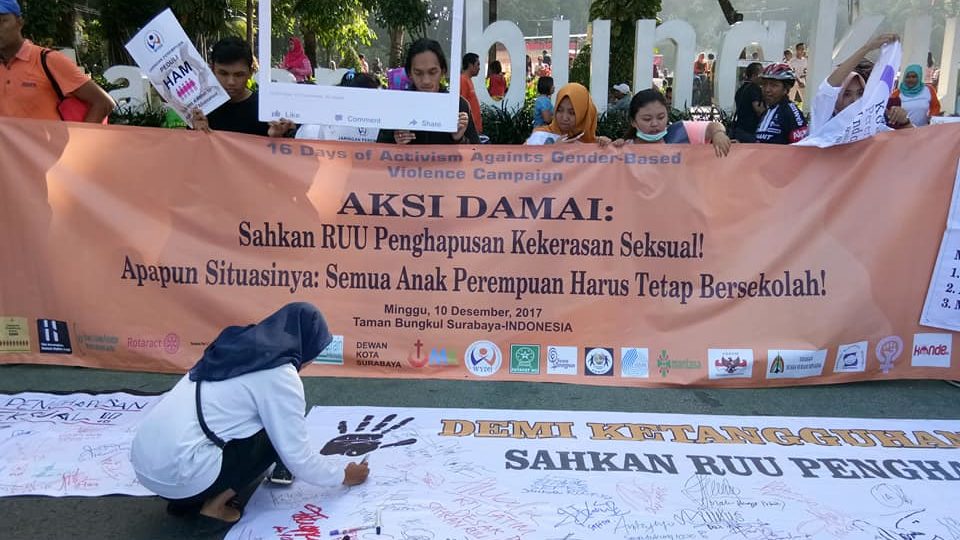Maimon Herawati, the woman perhaps best known as the initiator of an online petition demanding that Indonesian authorities take a “vulgar” Shopee ad featuring K-pop girl group BLACKPINK off the air, is back.
With the BLACKPINK ad banned by officials, Maimon has now turned her attention to the Elimination of Sexual Violence Bill, which was designed to protect women and ensure their rights over their own bodies but which Maimon is strongly opposing on religious grounds.
The self-proclaimed journalist and human rights activist (yeah, seriously) recently started a petition on Change.org titled “Tolak RUU Pro Zina” (“Say no to the Pro-Free Sex Bill”). Through her petition, she appealed to the Parliament’s Commission VIII — in which the bill has been in limbo since 2016 — and Komnas Perempuan (National Commission on Violence Against Women), which helped draft the bill, to never pass it into law.
In the petition, Maimon starts by saying that the goal of the Elimination of Sexual Violence Bill is “right and very good” because it supports the idea that women should have control over their own bodies and be safe from sexual violence.
But Maimon’s problem with the bill stems from claim that it protects all consensual extramarital sexual relations, which “violate moral norms and religion.”
Maimon goes on to list various moral/religious violations within the bill were ratified, including extra-marital sex still being permissible (i.e. not criminalized) and husbands being prosecuted for “poking” their unwilling wives.
The latter complaint refers to the bill explicitly making sexual assault by a husband against his wife a crime, whereas currently it is a legal grey area.
Maimon also argues that the bill would make voluntary abortions legal and would criminalize mothers who force their daughters to wear the hijab (both assertions that are not actually supported by the bill’s language).
She also warned that the bill would support same-sex relations. In fact, the bill only acknowledges that sexual violence can take place between same-sex partners to provide protection to the victims of such crimes — that acknowledgment has reportedly been one of the major roadblocks to the bills passage.
Maimon wrote that the bill is close to being ratified and members of parliament from Islamic political parties don’t have the numbers to stop it. She appeals to “family-loving Indonesians” to unite and reject the bill through her petition.
“This Bill clearly violates the values of righteousness, and disrupts justice for Indonesian families who believe that adultery seen from any aspect is a vile act, even when there’s consent!” Maimon concludes her petition.
As of Monday afternoon, more than 37,000 people have signed Maimon’s petition.
The Elimination of Sexual Violence Bill, which entered the National Legislation Program in 2016, was drafted by Komnas Perempuan in cooperation with the Service Provider Forum (FPL).
The bill clearly defines different forms of sexual violence and sets out the responsibilities of the state in dealing with each of those instances. It also provides for the protection of victims and witnesses, increases their access to justice, recovery and reparation mechanisms for victims and rehabilitation for offenders.
Proponents of the bill argue that it’s ratification is desperately needed to update the current archaic laws on sexual violence (which were drafted over 100 years ago during colonial times) and bring about more comprehensive legal protections and recovery mechanisms for victims.
Under the current Indonesian Criminal Code (KUHP), broadly speaking, there are only two forms of sexual violence that are recognized, namely rape and molestation. The crime of rape in KUHP as it stands is extremely narrowly defined and limited to vaginal intercourse. This does not reflect current internationally accepted definitions and acts to deny thousands of rape victims their rights of access to justice.
The bill also includes a broader variety of sentencing options for the reformation and rehabilitation of the offenders, including community service, removal of the right to practice a profession and removal of office for public officials.
In terms of protection of children, for cases of sexual violence that occur in the domestic setting, there is a provision to terminate parental rights that will help to keep children safe from chronic abuse.




